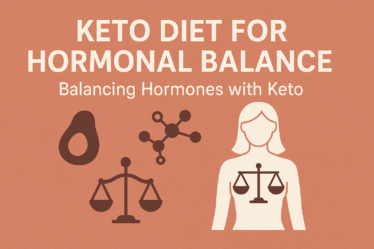
Learn how the Keto Diet may help reduce migraine attacks. Discover the benefits and effects of this low-carb, high-fat diet on migraine sufferers in 2025.
What is the Keto Diet?
The Keto diet is a high-fat, moderate-protein, and very low-carbohydrate eating plan that has gained popularity for weight loss and managing certain health conditions. The goal of the Keto diet is to shift the body from burning glucose (carbohydrates) for energy to burning fat, a state known as ketosis. This metabolic shift encourages the body to break down fat into ketones, which serve as an alternative fuel source.
How the Keto Diet Might Help With Migraines
Several studies and anecdotal evidence suggest that the Keto diet may help reduce the frequency and severity of migraines. Here are several ways the Keto diet may provide relief:
1. Reducing Inflammation
Migraines are often associated with inflammation and abnormal brain activity. The Keto diet is known to reduce systemic inflammation in the body, potentially reducing the inflammation that contributes to migraine attacks. The high-fat content of the diet, particularly the omega-3 fatty acids found in fish like salmon and mackerel, has been shown to have anti-inflammatory effects, which may help reduce migraine symptoms.
2. Regulating Blood Sugar Levels
Fluctuating blood sugar levels can trigger migraines in some individuals. On a traditional high-carb diet, blood sugar levels can spike and crash, leading to headaches and other symptoms. By following a low-carb, high-fat diet like Keto, blood sugar levels remain more stable. This stability may help prevent the blood sugar dips that often trigger migraine attacks.
3. Ketones as a Neuroprotective Agent
One of the most promising aspects of the Keto diet in relation to migraines is the production of ketones. Ketones are not only an alternative energy source but may also have neuroprotective properties. Research suggests that ketones may help stabilize nerve function and protect against excitability in the brain, both of which could potentially reduce the frequency of migraines.
4. Improved Mitochondrial Function
The Keto diet may help improve mitochondrial function, which plays a crucial role in energy production in the brain. Mitochondrial dysfunction is believed to be involved in the development of migraines. By promoting better mitochondrial function, the Keto diet may help reduce the likelihood of migraines triggered by mitochondrial imbalances.
5. Reducing Triggers
Certain foods are known migraine triggers, such as high-sugar, processed foods, and foods with artificial additives. The Keto diet eliminates many of these potential triggers, which may help people who suffer from migraines identify and avoid foods that could lead to an attack.
Scientific Evidence: Does the Keto Diet Help Reduce Migraines?
While the relationship between the Keto diet and migraines is still being studied, there is some scientific evidence suggesting that the Keto diet can be beneficial for migraine sufferers:
-
Case studies and small studies have shown that individuals who followed the Keto diet experienced a reduction in the frequency and intensity of their migraines. Some individuals reported a complete cessation of migraines, while others saw significant improvement.
-
A study published in the journal Cephalalgia, which examined the effects of the Keto diet on migraine sufferers, found that the diet significantly reduced the frequency of migraines. Participants on the Keto diet experienced fewer attacks and reduced migraine severity after several weeks on the plan.
-
Neurological studies also suggest that the ketogenic state may help to stabilize neuronal firing in the brain, reducing the kind of electrical activity that contributes to the pain associated with migraines.
Considerations and Potential Side Effects
While the Keto diet may offer relief for some migraine sufferers, it is important to consider a few things before starting:
-
Keto Flu: When first starting the Keto diet, some people experience symptoms known as the “Keto flu,” which can include headaches, fatigue, and nausea. These symptoms are temporary and usually resolve after the body adapts to ketosis. However, if you already suffer from migraines, the onset of Keto flu symptoms may be challenging.
-
Nutrient Deficiencies: The restrictive nature of the Keto diet may lead to deficiencies in certain nutrients, such as magnesium, potassium, and calcium. These deficiencies can sometimes contribute to headaches and migraines. It is important to monitor nutrient intake and, if necessary, take supplements.
-
Long-Term Effects: While the Keto diet may provide short-term relief from migraines, its long-term effects on migraine prevention are still not fully understood. Consulting a healthcare provider or nutritionist is recommended before making long-term changes to your diet.
-
Individual Variation: Not everyone will experience the same results with the Keto diet. While some people find great success in reducing their migraines, others may not see the same benefits. It’s essential to track your progress and discuss any concerns with a healthcare provider.
Conclusion: Can the Keto Diet Help With Migraines?
The evidence supporting the Keto diet’s effectiveness in reducing migraines is promising, though more research is needed to understand the full scope of its benefits. The diet’s ability to reduce inflammation, stabilize blood sugar levels, and protect brain function through ketones makes it a potential option for migraine sufferers looking for relief. However, individual results vary, and it’s important to approach any dietary change with caution and under the guidance of a healthcare professional.
For those who find that the Keto diet works well for them, it may provide a natural, long-term solution to reducing the frequency and severity of migraines, improving overall quality of life. If you’re considering trying the Keto diet for migraines, keep track of your symptoms and work with your doctor to ensure you’re making the right choice for your health.
F@Q about keto dite help reduce migrauine attacks.
1. Can the Keto diet help reduce migraine attacks?
Yes! Many studies suggest that the Keto diet can help reduce the frequency of migraine attacks. By reducing inflammation and stabilizing blood sugar levels, you may experience fewer migraines.
2. How does the Keto diet work in reducing migraines?
The Keto diet helps by stabilizing blood sugar levels, reducing inflammation, and promoting the production of ketones, which may have neuroprotective effects and reduce brain excitability, often linked to migraines.
3. Is it safe to start the Keto diet if I suffer from migraines?
For most people, starting the Keto diet is safe. However, it’s important to consult with your healthcare provider before making dietary changes, especially if you have chronic migraines, to ensure it’s the right choice for you.
4. Can the Keto diet cause headaches when starting?
Yes, when you first begin the Keto diet, you might experience “Keto flu,” which includes headaches as your body adapts to burning fat for energy. These symptoms usually subside after a few days.
5. Will the Keto diet work for everyone with migraines?
Not necessarily. While many people find relief, others may not experience the same results. It’s important to track your progress and discuss your experience with a healthcare provider.
6. How long does it take to see results from the Keto diet for migraines?
It can take several weeks to see significant changes in migraine frequency and severity. Be patient and stay consistent with your diet to give your body time to adapt and experience the benefits.
7. Are there any side effects to consider when starting the Keto diet for migraines?
Some people may experience nutrient deficiencies or initial side effects like fatigue or dizziness. It’s important to stay hydrated, get enough electrolytes, and consult with a nutritionist if necessary.
8. Can I still enjoy foods while on the Keto diet for migraines?
Absolutely! The Keto diet allows you to enjoy a variety of delicious high-fat, low-carb foods such as meats, fish, eggs, and healthy fats like avocado and olive oil, making it both enjoyable and effective.
9. How does the Keto diet compare to other migraine treatments?
The Keto diet offers a natural alternative to pharmaceutical treatments for migraines, focusing on dietary changes to manage symptoms. It may be a good option for those seeking a holistic approach.
10. What other benefits can I expect from the Keto diet besides migraine relief?
In addition to reducing migraines, the Keto diet can help with weight loss, improved energy levels, better brain function, and reduced inflammation, contributing to overall health and wellness.


